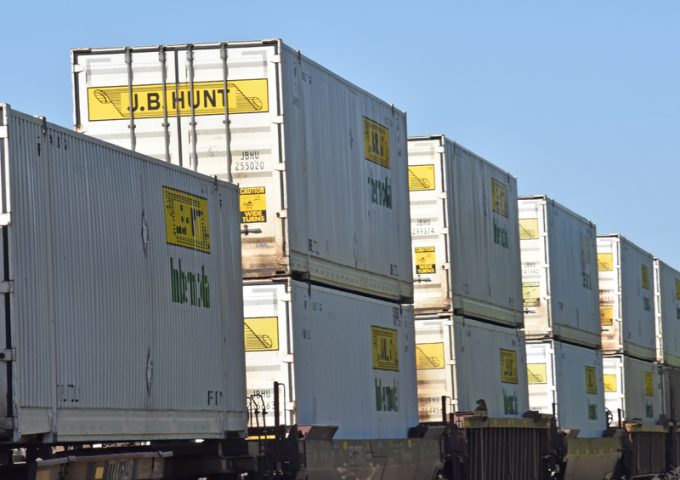US intermodal picking up steam as trucking woes continue
After a long trough of sluggish performance, US intermodal traffic is growing, and the market ...

Continuing decline in business is not halting investment plans at JB Hunt, as the firm prepares for a rebound in the market.
Its results for the second quarter reflect the headwinds: revenues dropped 18%, to $3.13bn, while operating income fell 23%, to $270.7m.
The slump was right across JB Hunt’s portfolio and management blamed reduced volumes and downward pressure on pricing.
Total freight transactions on the firm’s 360 platform slumped 40%, to $336m, revenue falling 43% for the company’s Integrated Capacity Solutions – 36% in intermodal and 31% in truckload. Overall, truckload revenue was down 16%, in intermodal and final mile services it sank 19% and Integrated Capacity Solutions ssaw a 43% drop.
At $1.49bn in revenue, the intermodal sector is the firm’s largest segment, accounting for nearly half its turnover. But operating income per load fell 24%, reflecting lacklustre demand and downward pricing pressure, and around 18% of its intermodal container fleet was idle during the quarter.
It could have been worse, however, said bullish JB Hunt president Shelley Simpson, adding: “We think our intermodal business is outperforming the industry.”
It’s an industry that remains in the doldrums. According to numbers from the Association of American Railroads, intermodal volumes in the week of 15 July were down 5.3%, year on year, an improvement on the 7.6% deficit the previous week, and through the first 28 weeks of the year, intermodal volumes were down 10%.
For Class I carrier CSX, which reported its quarter results last week, the decline in intermodal volumes more than offset the effects of volume growth in coal and merchandise, resulting in a drop of 3% in overall revenues in the period.
Darren Field, president intermodal said JB Hunt would keep working with its rail carriers “to produce a better product with improved visibility”. And its chances appear to have improved in recent months, after congestion in rail networks has largely cleared up and flows through the west coast gateways have been free of disruption.
However, volumes remain depressed and Ms Simpson described the past quarter as the second consecutive three-month period of a freight recession for the trucking industry, echoing her remarks three months ago after the presentation of JB Hunt’s Q1 results. Revenues had shrunk 7%: 4% in intermodal; 10% in truckload; and 42% on the brokerage side.
But throughout the second-quarter results call, management kept emphasising that the company was poised for a rebound in demand.
CEO John Roberts said: “We remain in a coiled spring status,” adding that JB Hunt had the network and capacity to meet a surge in volume, when it happened.
It remains unclear, though, how soon this is going to materialise. Mr Roberts noted that forecasts from clients at the outset of the year were “off the mark”, so today management remains cautious in its expectations.
Brad Hicks, EVP and president of highway services, commented that, based on current economic conditions, a normal freight peak in the second half of this year appeared unlikely. And as long as demand remains subdued, finances are not going to improve considerably. Mr Roberts said pricing was unlikely to lift margins in the near term, leaving volume as the most likely factor to raise them in the near future.
Nevertheless, management has no intention to dial back on its investment, which has been particularly strong on technology, notably the 360 platform. Mr Roberts said: “While we know we’re in turbulent water, the opportunities we see to invest in are probably as good as they’ve ever been.
“All segments present meaningful growth opportunities,” he added.
Comment on this article